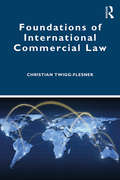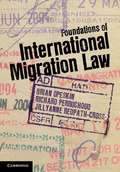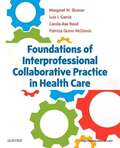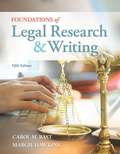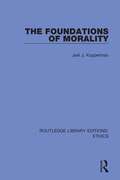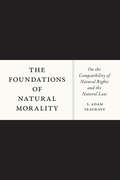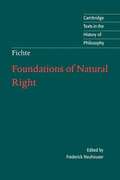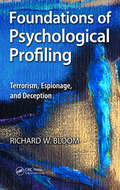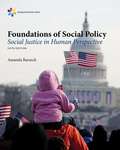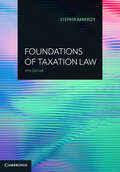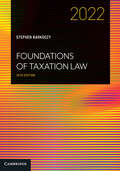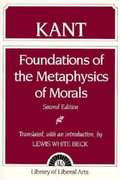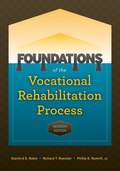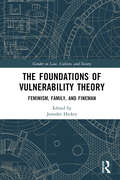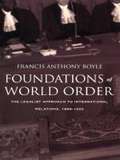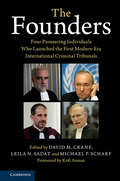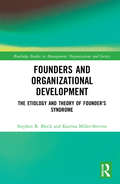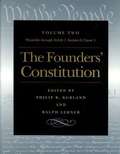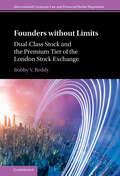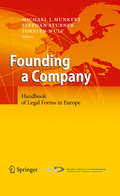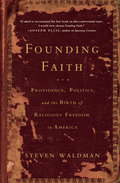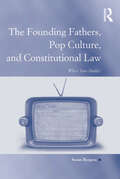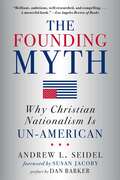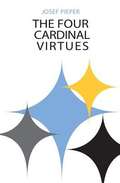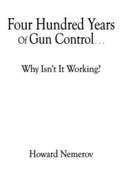- Table View
- List View
Foundations of International Commercial Law
by Christian Twigg-FlesnerFoundations of International Commercial Law provides a fresh analysis of both the contextual features of International Commercial Law and a range of different International Commercial Law instruments. This text covers the various elements which comprise International Commercial Law, the academic debates about the lex mercatoria and harmonisation, as well as a discussion of selected conventions and other instruments. International Commercial Law is concerned with commercial transactions which have an international dimension, for example contracts between parties from multiple jurisdictions. As an area of study, it is characterised by the interaction of a wide range of national and international legal sources which all shape the overall context within which international commercial contracts are made and performed. This book focuses on the international legal sources in particular. It first explores all the different elements which together comprise the context of international commercial transactions, before examining the process of making International Commercial Law. Specific instruments of International Commercial Law discussed in the book include the conventions on the international sale of goods, agency, financial leasing, factoring, receivables financing and secured interests in mobile equipment, together with the UNIDROIT Principles of International Commercial Contracts and documentary credits. There are separate chapters on private international law and international commercial arbitration, and a final chapter exploring the existing and potential impact of the digital economy on International Commercial Law. Offering a detailed overview of the main themes and key aspects of International Commercial Law, this book is for readers who are new to the subject, whether undergraduate or postgraduate students, legal scholars, practitioners or policymakers.
Foundations of International Migration Law
by Richard Perruchoud Brian Opeskin Jillyanne Redpath-CrossInternational migration law is an important field of international law, which has attracted exceptional interest in recent years. This book has been written from a wide variety of perspectives for those wanting to understand the legal framework that regulates migration. It is intended for students new to this field of study who seek an overview of its many components. It will also appeal to those who have focussed on a particular branch of international migration law but require an understanding of how their specialisation fits with other branches of the discipline. Written by migration law specialists and led by respected international experts, this volume draws upon the combined knowledge of international migration law and policy from academia; international, intergovernmental, regional and non-governmental organisations; and national governments. Additional features include case studies, maps, break-out boxes and references to resources which allow for a full understanding of the law in context.
Foundations Of Interprofessional Collaborative Practice In Health Care
by Margaret Slusser Luis I. Garcia Carole-Rae Reed Patricia Quinn McGinnisHealth care is a team effort, so why keep training for solo sprints?Introducing Foundations of Interprofessional Collaborative Practice in Health Care - a unique new textbook that will equip you to become an effective member of interprofessional healthcare teams. This completely new textbook is the first on the market to introduce the Interprofessional Education Collaborative (IPEC, 2011, 2016) Core Competencies for Interprofessional Collaborative Practice and to provide practice in applying these competencies to everyday practice. Expertly written by an interprofessional team for a wide variety of health professions students, this textbook provides a solid foundation in the four Core Competencies: Values and Ethics for Interprofessional Practice, Roles and Responsibilities, Interprofessional Communication, and Teams and Teamwork. It then elaborates each Core Competency by defining and describing each Sub-Competency. With a variety of interactive Case Studies, Caselets, and Exemplar Case Studies, it then illustrates the contributions and interconnectedness of each provider’s role to demonstrate how Core Competencies would be applied and put into action for improved patient outcomes. UNIQUE! Three-part units each addressing one of the four IPEC Core Competencies to help you to understand the core competencies and learn how to apply them in your own profession. UNIQUE! Detailed explorations of each Sub-Competency for all four IPEC Core Competencies thoroughlypresent the essential elements of each Core Competency for deep understanding of how to collaborate with other professions. UNIQUE! Case Studies, "Caselets," and Exemplar Case Studiesillustrate each competency and provide opportunities for you to apply your understanding of the material. A variety of Active Learning activities driven by core content are integrated into each chapter. UNIQUE! Global Perspectives boxes and additional international resources highlight the important work being done internationally in interprofessional education and interprofessional collaborative practice. Research Highlights help you to understand the reasoning and knowledge behind the Core Competencies. Learning Outcomes and Key Pointsoutline and review the main takeaways from each chapter.
Foundations Of Legal Research And Writing
by Carol M. Bast Margie HawkinsFOUNDATIONS OF LEGAL RESEARCH AND WRITING, Fifth Edition is the ideal resource for paralegals. The book's up-to-the-minute coverage tackles the ever-evolving areas of computer-assisted research and Cyber law, in addition to traditional legal research, analysis, and writing. Extensive research chapters address primary and secondary sources, citating, Lexis/Nexis, the Internet, and more, while writing sections center on drafting client opinion letters, pleadings, contracts, office memos, memoranda of law, and appellate briefs. Every chapter gives you practice writing opportunities, as well as traditional and computer-assisted research assignments to help develop your skills. Detailed case excerpts, samples, tips, and discussions further support the assignments, and illustrate the many perils of inadequate research and poor legal writing. Readers everywhere agree that FOUNDATIONS OF LEGAL RESEARCH AND WRITING, Fifth Edition delivers the concepts you need for success in the most demanding law firms and legal departments today.
The Foundations of Morality
by Joel J. KuppermanOriginally published in 1983, this book maintains that the content and character of morality can be understood if it is regarded as a useful societal tool, whose central purposes include the prevention of harm and promotion of security for members of society. At the foundation is the general superiority of policies and attitudes that have good consequences. The book argues that ethics is ‘cognitive’ and explores the kinds of ethical knowledge and the ways in which ethical claims can be challenged and justified.
The Foundations of Natural Morality: On the Compatibility of Natural Rights and the Natural Law
by S. Adam SeagraveRecent years have seen a renaissance of interest in the relationship between natural law and natural rights. During this time, the concept of natural rights has served as a conceptual lightning rod, either strengthening or severing the bond between traditional natural law and contemporary human rights. Does the concept of natural rights have the natural law as its foundation or are the two ideas, as Leo Strauss argued, profoundly incompatible?With "The Foundations of Natural Morality, " S. Adam Seagrave addresses this controversy, offering an entirely new account of natural morality that compellingly unites the concepts of natural law and natural rights. Seagrave agrees with Strauss that the idea of natural rights is distinctly modern and does not derive from traditional natural law. Despite their historical distinctness, however, he argues that the two ideas are profoundly compatible and that the thought of John Locke and Thomas Aquinas provides the key to reconciling the two sides of this long-standing debate. In doing so, he lays out a coherent concept of natural morality that brings together thinkers from Plato and Aristotle to Hobbes and Locke, revealing the insights contained within these disparate accounts as well as their incompleteness when considered in isolation. Finally, he turns to an examination of contemporary issues, including health care, same-sex marriage, and the death penalty, showing how this new account of morality can open up a more fruitful debate.
The Foundations Of Natural Right, according to the Principles of the Wissenschaftslehre
by J. G. Fichte Frederick Neuhouser Michael BaurIn the history of philosophy, Fichte's thought marks a crucial transitional stage between Kant and post-Kantian philosophy. Fichte radicalized Kant's thought by arguing that human freedom, not external reality, must be the starting point of all systematic philosophy, and in Foundations of Natural Right, thought by many to be his most important work of political philosophy, he applies his ideas to fundamental issues in political and legal philosophy, covering such topics as civic freedom, rights, private property, contracts, family relations, and the foundations of modern political organization. This volume offers a complete translation of the work into English, by Michael Baur, together with an introduction by Frederick Neuhouser that sets it in its philosophical and historical context.
Foundations of Psychological Profiling: Terrorism, Espionage, and Deception
by Richard BloomProfiling is a hot topic today. The post-9/11 "War on Terrorism" has engendered political, ethical, and scientific controversy over its use. The proliferation of recent films, television programs, and books is a sociocultural indicator of widespread interest. Designed for a diverse audience including law enforcement officers, intelligence and secur
Foundations of Social Policy: Social Justice in Human Perspective (Sixth Edition) (Empowerment Series)
by Amanda Smith Barusch<p>Reflecting the idea that social justice is a primary mission of the social work profession, this text provides a thorough grounding in policy analysis -- with coverage of policy practice and a unique emphasis on the human dilemmas inherent in the pursuit of social justice. Aligned with current standards and core competencies, Foundations of <p>Social Policy, 6th Edition introduces you to philosophical perspectives on what constitutes social justice, and identifies values and assumptions reflected in contemporary policy debates. Students have said they like how this book deepens their understanding of current developments, including topics straight from the headlines. The book also introduces you to people whose lives are influenced by U.S. policies, as well as to those who have shaped the policies.</p>
Foundations of Taxation Law
by Stephen BarkoczyFoundations of Taxation Law provides a clear and comprehensive introduction to the policy, principles and practice that underpin the Australian taxation system. Designed as a guide for law and business students as well as tax practitioners, the text blends policy issues, taxation theory, black letter law and commercial practice into a succinct general principles text. Topics are presented in a logical and structured order and are cross-referenced to specific provisions in the legislation and relevant cases so that readers are able to easily find the source of the law. The text includes approximately 400 examples and dozens of diagrams and tables that condense the law and help clarify difficult concepts. This edition contains expanded technical and policy discussion of several areas of law. It has been substantially revised and restructured to take account of the many important legislative reforms, case law developments and announcements that have occurred over the last 24 months.
Foundations of Taxation Law 2022
by Stephen BarkoczyFoundations of Taxation Law provides a clear and comprehensive introduction to the policy, principles and practice underpinning the Australian taxation system. Designed as an introductory guide for law and business students as well as tax practitioners, the text focuses on general principles, blending policy issues, taxation theory, technical 'black letter law' and commercial practice into a succinct, principled text. Topics have been developed in a logical, structured order and are cross-referenced to specific provisions in the legislation and relevant cases so that readers can easily find the source of the law. The text includes approximately 400 examples and dozens of diagrams and tables that condense the law and clarify difficult concepts. This fourteenth edition has been substantially revised and restructured to take account of many important legislative reforms, case law developments, administrative changes and policy announcements. It is designed to be used in conjunction with the Core Tax Legislation and Study Guide 2022.
Foundations of the Metaphysics of Morals
by Immanuel Kant Lewis White BeckImmanuel Kant is known for his philosphy of ethics in relation to taking actions according to a categorical imperative and with the intent of dutifulness, rather than acting on ones desires or expectations of outcomes. This book is considered to be a summary of Kant's philosophy of ethics, written for a wider audience than most of his other works. Still, it is Kant and it is philosophy, so it is pretty deep reading. This book also includes a short essay titled, What is Enlightenment. This book is translated from German, but still retains a few German words, along with the Latin words common in books of philosophy. In addition to the regular page numbers, this book also has page numbers from a standard edition of Kant's works. In the printed version, these numbers were in the margin. In this copy they are in the text next to the word they were nearest in the printed text. This means they are often in the middle of a sentance.
Foundations Of The Vocational Rehabilitation Process
by Stanford E. Rubin Richard Roessler Phillip D. RumrillThe seventh edition of Foundations of the Vocational Rehabilitation Process provides historical, philosophical, legislative, and sociological foundations for the habilitation/rehabilitation of persons with disabilities. A thorough and current introduction to the American vocational rehabilitation process, this edition addresses mandates presented in the current major pieces of disability legislation influencing the practice of rehabilitation.This book presents theoretical and practical assistance in translating those mandates into positive action. It is this dual process of individual and environmental proactivity that can maximize the rehabilitation of disabled individuals. Not just for the dedicated rehabilitation counselor, this book is also for students attending an introductory course at the master's- or senior-level and in-service directors who design informative training programs. New in the seventh edition:Updated chapter on how "The Americans with Disabilities Act" (ADA), as amended in 2008, prohibits discrimination on the basis of disability in employment, public services, accommodations, and telecommunications. Updated section on the right to medical treatment in light of the 2012 "Affordable Care Act" (ACA). New information and updated references were added on the five disability types--physical disabilities, emotional disorders, intellectual disabilities, learning disabilities, and visual impairments and blindness. Now includes more than 1300 references, 300 of which are new.
The Foundations of Vulnerability Theory: Feminism, Family, and Fineman (Gender in Law, Culture, and Society)
by Jennifer HickeyThis volume is the first collection of Martha Albertson Fineman’s most important and influential work. Feminist legal theorist Martha Albertson Fineman has spent decades pushing the boundaries of law, questioning and reconceptualizing legal and social definitions of family, dependency, vulnerability, and state responsibility. The pieces collected in this book trace the arc of Fineman’s scholarship, from gender equality; to the role of the family as a social institution; to dependency; to autonomy; to the legal subject and vulnerability theory. This book reflects a lifetime of radical reimagining of the relationship between the state, individuals, families, and other social institutions that is just as relevant today, if not more so. In this book, Fineman offers a foundation for the achievement of true social justice, through the centering of our shared human vulnerability and dependency, grounded in the recognition of the ontological body and its material needs. Arranged in sections, and introduced by leading scholars in the field, these pieces ask us to re-examine our legally enshrined commitment to formal equality and the “mythological” autonomous independent legal subject; recognizing instead that we must call for an active and responsive state that meaningfully provides resilience through its social institutions. This collection demonstrates an evolution of heretical thought that has always pressed for a deeper understanding of the foundations of law and society, offering a model for other scholars on how to keep pressing through the hard work of thinking and rethinking the conceptual basics of language, law, society, and justice. This book will appeal to academics, policymakers, lawyers, activists, and students in law and politics theory with interests in law and society, human dependency and vulnerability, state responsibility, and feminism and the family; as well as others who have applied Fineman’s vulnerability theory to issues in the fields of bioethics, artificial intelligence, and policing, to name just a few.
Foundations of World Order: The Legalist Approach to International Relations, 1898–1922
by Francis Anthony BoyleIn Foundations of World Order Francis Anthony Boyle provides the first historically comprehensive analysis of U.S. foreign policy regarding international law and organizations. Examining the period from the Spanish American War to the establishment of the League of Nations and the Permanent Court of International Justice, Boyle argues that the international legal framework created at the beginning of the twentieth century not only influenced the course of American foreign policy but also provided the foundation upon which relations among states were built. Although both the League of Nations and the Permanent Court of International Justice were rejected by the U.S. Senate, Boyle shows how the early governance of these institutions--precursors, respectively, to the United Nations and the International Court of Justice--informed later efforts to reduce and regulate transnational threats and the use of military force. Delving into such topics as the United States and its initial stance of neutrality in World War I and its imperial policy toward Latin America and the Caribbean, Boyle offers detailed readings of the relevant treaties, tribunals, and conferences, and assesses the political actors involved. Taking up the legalist point of view, he discusses the codification of customary international law, the obligatory arbitration of international disputes, and the creation of a new regime for the settlement of such disputes. Boyle has provided in Foundations of World Order a compelling portrait of the relationship between political power and law, and of the impact of these forces on U.S. diplomacy. This volume will serve as a valuable resource to students, scholars, and practitioners of international law; it will also be of great interest to historians and political scientists engaged with issues of U.S. foreign policy and diplomatic history.
The Founders: Four Pioneering Individuals Who Launched The First Modern-era International Criminal Tribunals
by Michael P. Scharf David M. Crane Leila N. SadatThe Balkan Wars, the Rwanda genocide, and the crimes against humanity in Cambodia and Sierra Leone spurred the creation of international criminal tribunals to bring the perpetrators of unimaginable atrocities to justice. <P><P>When Richard Goldstone, David Crane, Robert Petit, and Luis Moreno-Ocampo received the call - each set out on a unique quest to build an international criminal tribunal and launch its first prosecutions. Never before have the founding International Prosecutors told the behind-the-scenes stories of their historic journey. With no blueprint and little precedent, each was a path-breaker. <P>This book contains the first-hand accounts of the challenges they faced, the obstacles they overcame, and the successes they achieved in obtaining justice for millions of victims.<P>Provides contextual placement of modern tribunals.<P> Covers the creation of modern international criminal law.<P> Offers a chief prosecutor's perspective for the first time.
Founders and Organizational Development: The Etiology and Theory of Founder's Syndrome (Routledge Studies in Management, Organizations and Society)
by Stephen R. Block Katrina Miller-StevensFounders and Organizational Development: The Etiology and Theory of Founder’s Syndrome is designed to help today’s researchers, faculty, students and practitioners become familiar with the etiology and dynamics of Founder’s Syndrome as an organizational condition challenging nonprofit/nongovernmental, social enterprise, and for-profit and publicly traded organizations. The book uses applied social and psychological theories and concepts to peel away the layers of an organizational enigma, revealing three causes of Founder’s Syndrome and insight into the power and privileges assumed by founders who engage in undesirable and self-destructive behaviors leading to their termination; going from hero status to antihero. Researchers, instructors, students, and practitioners will find thought-provoking case studies from the real world of organization development practice. Segments from interviews during interventions reveal the type of emotional turmoil experienced in organizations where founder’s syndrome is present. Insight is provided into accounts of well-known founders who were terminated or forced to resign. The unique features of this book include: integrating theory into practice, describing a new theory about the psychological reaction of founder’s syndrome victims, prevention ideas when designing new organizations, strategies for intervention, using content based on research and organization development consultation experiences, and, integrating feedback from students who have launched organizations.
The Founders' Constitution Volume One Major Themes
by Philip B. Kurland Ralph Lerner<P>The Founders Constitution is the most important of all resources on the principles of the Framers of the American republic. <P>The work consists of extracts from the leading works of political theory, history, law, and constitutional argument on which the Framers and their contemporaries drew and which they themselves produced.
Founders without Limits: Dual-Class Stock and the Premium Tier of the London Stock Exchange (International Corporate Law and Financial Market Regulation)
by Bobby V. ReddyBig Tech has flourished on the US public markets in recent years with numerous blue-chip IPOs, from Google and Facebook, to new kids on the block such as Snap, Zoom, and Airbnb. A key trend is the burgeoning use of dual-class stock. Dual-class stock enables founders to divest of equity and generate finance for growth through an IPO, without losing the control they desire to pursue their long-term, market-disrupting visions. Bobby Reddy scrutinises the global history of dual-class stock, evaluates the conceptual and empirical evidence on dual-class stock, and assesses the approach of the London Stock Exchange and ongoing UK regulatory reforms to dual-class stock. A policy roadmap is presented that optimally supports the adoption of dual-class stock while still protecting against its potential abuses, which will more effectively attract high-growth, innovative companies to the UK equity markets, boost the economy, and unleash the true potential of 'founders without limits'.
Founding a Company
by Michael J. Munkert Torsten Wulf Stephan StubnerThe book "Founding a Company - Handbook of Legal Forms in Europe" provides an easily accessible overview of the most important information any entrepreneur or manager needs when deciding for a legal form of the business. This makes it especially interesting for companies that decide to enter new markets within Europe and need to understand which requirements and advantages the different legal forms have. With the structured presentation of this information for ten different countries the book allows for quick comprehension and comparison of the aspects discussed. The book is a valuable resource for entrepreneurs, consultants and anybody who supports the business formation process in Europe as well as for lecturers and students working in this field.
Founding Faith
by Steven WaldmanWith refreshing objectivity, beliefnet. com editor in chief Waldman narrates the real story of how America's Founding Fathers forged a new approach to religious liberty--a revolutionary formula that promoted faith by leaving it alone.
The Founding Fathers, Pop Culture, and Constitutional Law: Who's Your Daddy? (Law, Justice And Power Ser.)
by Susan BurgessApplying innovative interpretive strategies drawn from cultural studies, this book considers the perennial question of law and politics: what role do the founding fathers play in legitimizing contemporary judicial review? Susan Burgess uses narrative analysis, popular culture, parody, and queer theory to better understand and to reconstitute the traditional relationship between fatherhood and judicial review. Unlike traditional, top-down public law analyses that focus on elite decision making by courts, legislatures, or executives, this volume explores the representation of law and legitimacy in various sites of popular culture. To this end, soap operas, romance novels, tabloid newspapers, reality television, and coming out narratives provide alternative ways to understand the relationship between paternal power and law from the bottom up. In this manner, constitutional discourse can begin to be transformed from a dreary parsing of scholarly and juristic argot into a vibrant discussion with points of access and understanding for all.
The Founding Myth: Why Christian Nationalism Is Un-American
by Andrew L. SeidelA new approach to the "christian nation" is needed more than ever in today's political climate. Christian nationalists assert that our nation was founded on Judeo-Christian principles, and advocate an agenda based on this popular historical claim. But is this belief true? The Founding Myth answers the question once and for all. Constitutional attorney Andrew L. Seidel builds his case point by point by comparing the Ten Commandments to the Constitution and contrasting biblical doctrine with America's founding philosophy, showing that the Declaration of Independence contradicts the Bible. Thoroughly researched, this persuasively argued and provocative book proves that America was not built on the Bible and that Christian nationalism is un-American. With a new epilogue reflecting on the role Christian nationalism played in fomenting the January 6, 2021, insurrection in Washington, DC.
The Four Cardinal Virtues: Prudence, Justice, Fortitude, Temperance
by Josef PieperIn The Four Cardinal Virtues, Josef Pieper delivers a stimulating quartet of essays on the four cardinal virtues. He demonstrates the unsound overvaluation of moderation that has made contemporary morality a hollow convention and points out the true significance of the Christian virtues.
Four Hundred Years of Gun Control: Why Isn't It Working?
by Howard NemerovThe subject of gun control for many seems to be a modern issue, but it has been with America since before the nation's inception. Has gun control best served the people or its architects? Investigative analyst Howard Nemerov compares the rhetoric and the legislation to the reality of how gun control's promises and laws have come to affect real people. Nemerov documents the pattern and practice as it has operated throughout the entire life of the nation to date. Today, the observation is that gun control has not worked...Or has it, and for whom? Otherwise, after four hundred years: Why isn't it working?
